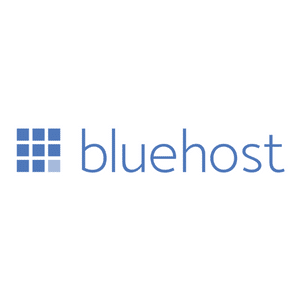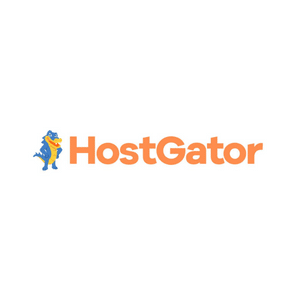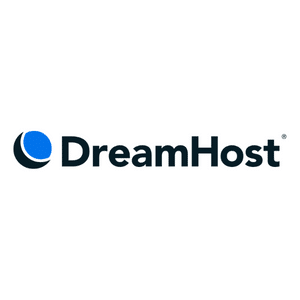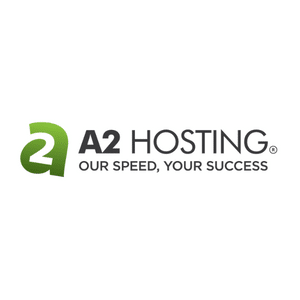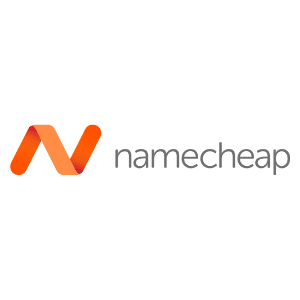Are you looking to get your small business online in 2023?
Congratulations – you’re already one step ahead of the game.
In today’s digital world, having a website is essential for any business that wants to remain competitive and see substantial growth.
My name is Garret Smith and I made this guide to help out small business owners looking to find the best web hosting for their business. After all, picking the wrong web host can be a costly mistake down the road. I’ve worked with all of these hosting companies throughout my years as a web design agency owner and developer.
I built a staging site at tybtestsite.com and tested each hosting option below.
We looked at:
- Speed
- Security
- Customer Service
- Features
- Price
- Pros
- Cons
Let’s take a look at the list of the best web hosting companies to launch your small business site!
Bluehost
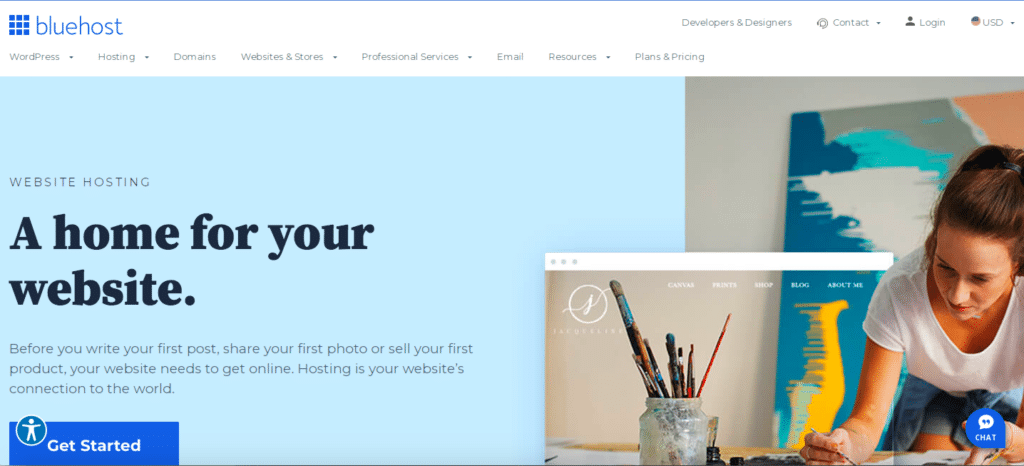
Bluehost ranks as one of our chosen best web hosting companies because of their affordable price plans, high percentages of uptime, and reliable basic features that are important for small businesses.
For more of an in-depth look, check out our Bluehost review.
Bluehost Key Features
- 99.98% uptime
- Pricing doesn’t increase too much after beginner discounts
- 24/7 live chat and phone support + knowledge center
- Free domain for first year
- Free SSL certificate (security protection)
- Unmetered bandwidth
Bluehost Pricing Plans
Bluehost’s pricing plans range from $2.95-$28.99 for your first year.
Even the most expensive option (Pro) is still relatively affordable, especially compared to some other hosting sites you may encounter.
The Basic plan is likely most relevant if you’re just looking to run one site for your small business.
This plan, the cheapest they offer, comes with 10 GB of storage, custom WordPress themes, a free domain for one year, free SSL for one year, and a free CDN to manage your site.
We recommend scaling up after the first year, as you’ll probably have experienced the business growth to need more storage.
Bluehost Pros and Cons
Bluehost Pros
- 30-day money-back guarantee and free domain name allow you to test the waters without overspending
- Unmetered bandwidth allows heavy site traffic
- Variety of resources for help running your site
- Affordable
- Security-backed
- Easy WordPress installation
Bluehost Cons
- Site migration tailored for WordPress, not other site templates
- Slightly less uptime than other hosting services, like HostGator
- Smaller amount of storage space in the basic plan will likely require upgrades
HostGator
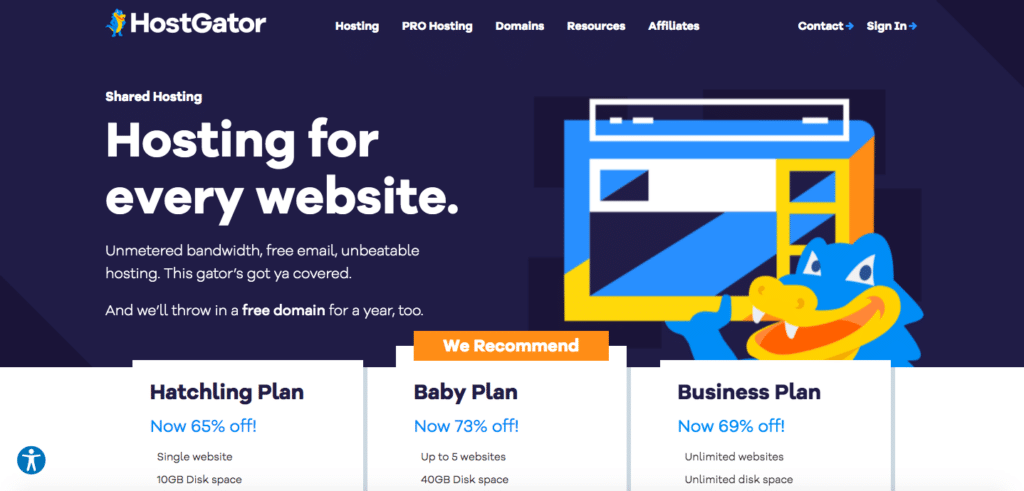
HostGator is another solid option for hosting your small business site(s).
Thanks to their excellent reviews and ranking when it comes to reliable performance and customer support, they’re one of the best options for beginners to site creation.
If you’re setting up a new website, HostGator offers a ton of helpful resources to help you every step of the way.
On top of all this, HostGator offers add-on eCommerce options to make your site function like a real store.
HostGator Key Features
- Affordable price packages for every step of the site-building process
- 99.9% uptime guarantee
- Free SSL
- Free domain for first year
- Unmetered bandwidth
HostGator Pricing Plans
Depending on your needs as a small business owner, we’d recommend either the Hatchling Plan ($2.75/mo) or the Baby Plan ($3.50/mo).
Each plan comes with easy WordPress installation, unmetered bandwidth, free SSL, one free domain for the first year, 24/7 support, 99% uptime, and SEO analytic tools.
The only difference between the two is that the Baby Plan offers unlimited websites.
HostGator Pros and Cons
HostGator Pros
- Small-business tailored with eCommerce features
- Rich wealth of information about SEO and maintaining a secure site
- Reliable uptime is as high as it gets at 99.99%
- One month credit in return for failed uptime
- Great value in price packages
HostGator Cons
- Add-ons like their site builder can get pricey
- Slight price jump to go from one website to two -- best value if you have multiple sites
DreamHost
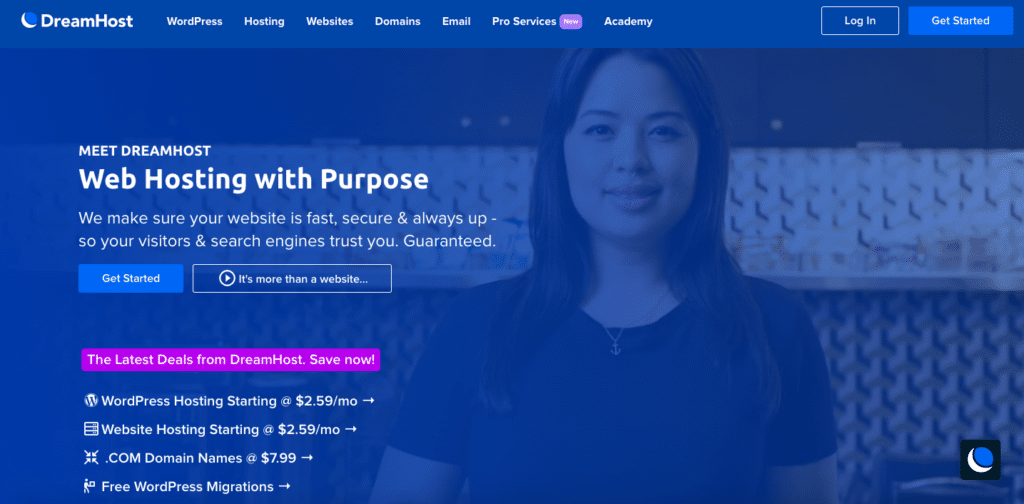
DreamHost is best known for its excellent uptime and intuitive site builder.
It also offers tons of storage space, quality features, pre-installed WordPress, and automatic daily backups — a site owner’s dream.
DreamHost Key Features
- Best-in-class customer service team operated by real people, not robots
- Quality security protections
- Unlimited site traffic
- Beginner-friendly control panel
- 99.99% uptime
DreamHost Pricing Plans
This WordPress-based web hosting company offers plans that start at $2.95/month.
The basic package comes with a year’s free domain name, unlimited web traffic (which sets it apart from other host companies), unmetered bandwidth, and 50 GB SSD storage.
DreamHost Pros and Cons
DreamHost Pros
- Unlimited web traffic
- Money-back guarantee for 97 days
- Solid amount of storage and uptime
- Great value for price plan
- WordPress friendly
DreamHost Cons
- No phone customer support
- No free email addresses included with basic plan
A2 Hosting

A2 Hosting boasts an excellent hosting speed, top-notch security, and an easy setup — and they’ve got the reviews to back them up.
They’re a great option for first-time site operators due to their “Help Me Choose” features when trying to decide on a hosting plan.
If you already have a site set up, they offer super easy migrations.
A2 Hosting Key Features
- 30-day money-back guarantee
- Global server locations for fast load times
- Free SSL
- Option to add on A2 site builder
A2 Hosting Pricing Plans
A2’s Startup Plan is either $10.99/month or $2.99 when you pay for a year upfront.
If you want a decked-out eCommerce store, the 100 GB of storage available in this package makes that dream a reality.
If you want more sites, try their Drive Plan at $5.99 per month for a year.
A2 Hosting Pros and Cons
A2 Hosting Pros
- Fast loading times
- Reputable customer service
- Customizable site builder
- Learning resources for beginners
A2 Hosting Cons
- On the pricier side
- No free domain name
Namecheap
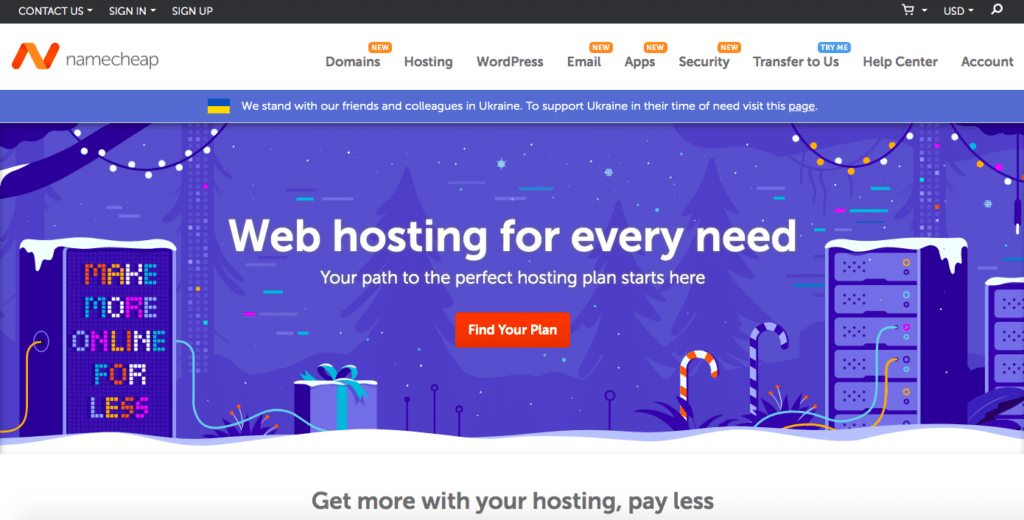
Namecheap isn’t just for domain names — they offer a slew of web hosting packages, as well.
Their plans are affordable and are so small-business-friendly that they almost seem tailored.
They’re an especially good option for site owners who don’t want to deal with complex setups.
Namecheap Key Features
- Free and easy site migration
- Super accessible site builder
- Fast load times
- Optional quiz available to assess your site’s needs
- Plans appropriate for beginners and small sites
Namecheap Pricing Plans
The best small business plan on Namecheap is the Stellar Business plan, which starts at $1.48/month for the first year.
This plan comes with 30 mailboxes, 20 GB of storage, 3 websites, and a domain name — all for less than $40/year.
Namecheap Pros and Cons
Namecheap Pros
- Plethora of mailboxes so you can have your staff represented through your site
- Affordable plan
- Accessible interface
- Usage designed for beginners, not web experts
Namecheap Cons
- Less storage than other plans
- Price increase after first year
InMotion Web Hosting
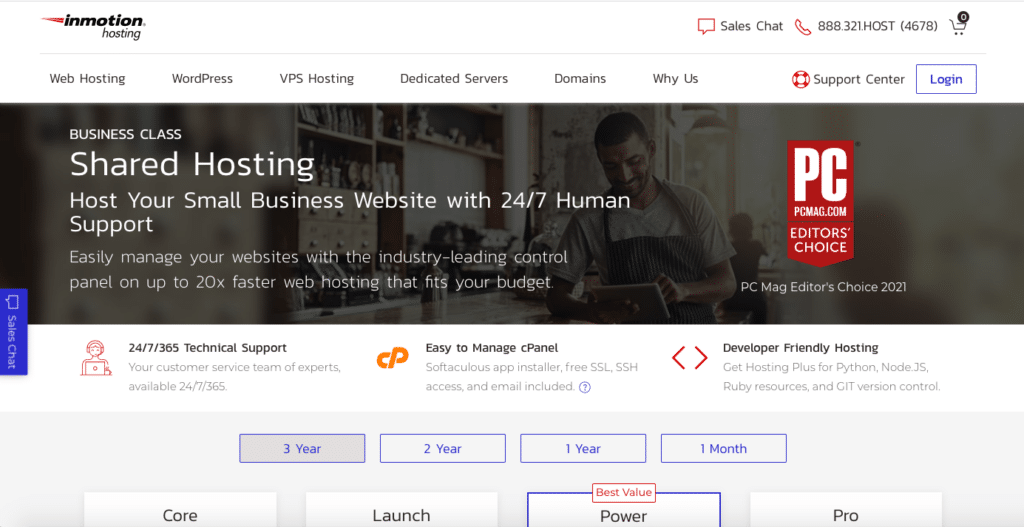
InMotion Web Hosting is a solid website with enough power to support sites with smaller rates of traffic.
This web hosting provider is known for reliable, stable speed and site stability.
Their shared plans are advertised directly to small business owners due to their easy-to-use control panel and 24/7 Human Support guarantee.
Furthermore, they offer developer resources for Python, Node, Ruby, or GIT-trained web owners interested in writing code for their sites.
InMotion Key Features
- 24/7 technical support
- Intuitive control panel to install apps and use your company email
- Developer-friendly host packages
InMotion Pricing Plans
InMotion recommends their Core Plan for small business owners.
This plan is on the pricier side, but it’s the best we’ve found so far for developer web hosts.
It comes with 100 GB of storage, two websites, unlimited bandwidth, promises of fast speed, 10 email addresses, and a host of marketing tools.
InMotion Pros and Cons
InMotion Pros
- Extra features like a site builder, advertising credits, and customer management software
- Developer-friendly
- Larger amount of storage than other similarly-priced packages
- Good value for price
InMotion Cons
- Package is pricey for those looking for a less complex web hosting service
FatCow Web Hosting
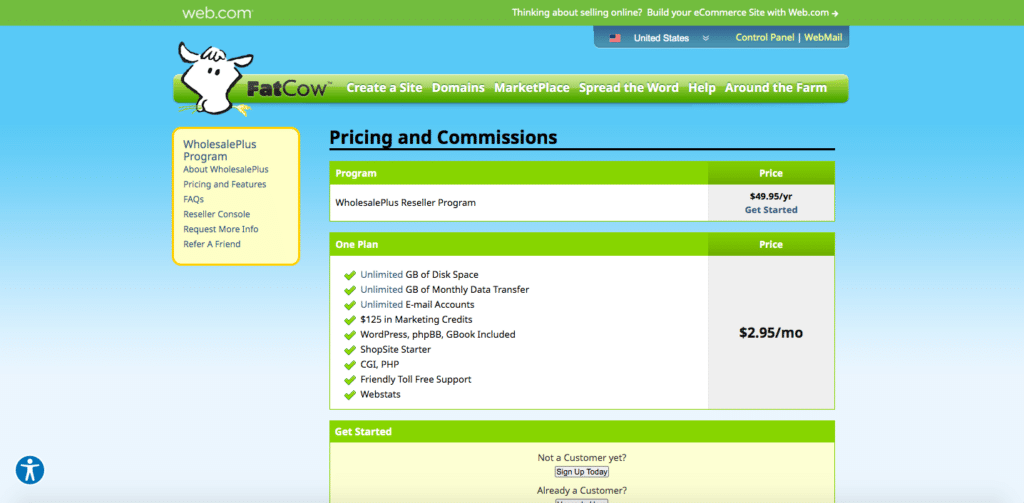
FatCow is an excellent budget choice for beginner site owners.
They’re a popular pick for small businesses due to their cheap price packages.
Their comprehensive web hosting offerings are smaller than other major web hosting companies, but this allows for cheap pricing and excellent service in the small-business niche.
They also offer easy site transfers including a free domain name transfer.
FatCow Key Features
- Straightforward site builder
- Google Ad credits
- 24/7 customer support
- Email Accounts
- SSL
- Unlimited MySQL databases
- 99.95% uptime
FatCow Pricing Plans
FatCow’s web hosting starts at $4.08 per month at an introductory rate.
This package includes a slew of beginner-customer-friendly features like a setup wizard and simple site builder.
FatCow Pros and Cons
FatCow Pros
- Especially simple-to-use web host
- Advertising credits come with package
- Overall, the most dependable web host for beginners
FatCow Cons
- On the pricier side
- Site transfers aren't free
IONOS Web Hosting
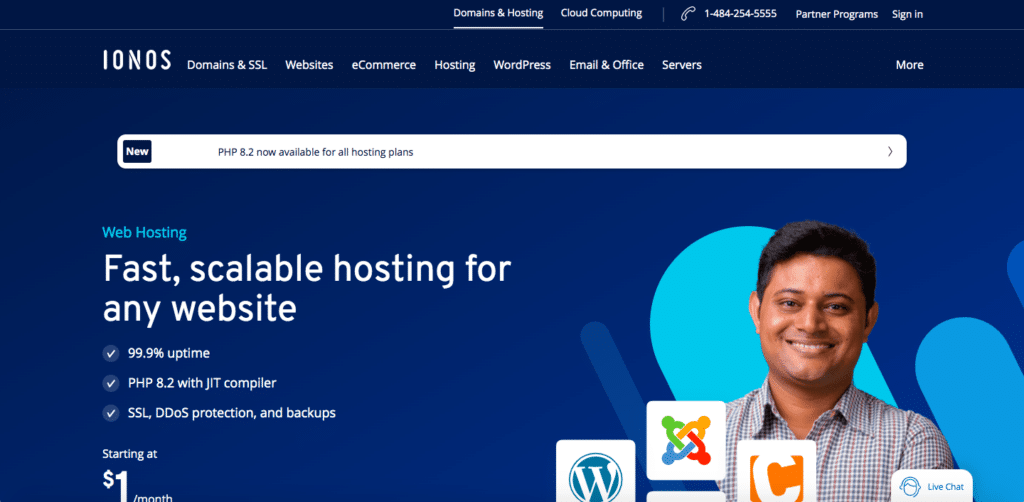
We chose IONOS Web Hosting because their packages are tailored for entrepreneurs and startups, as well as larger businesses.
IONOS offers an impressive array of features that can help you get your website up and running quickly with zero hassles.
IONOS Key Features
- Nearly 100% uptime
- Fast load times
- High security levels
- Free email
IONOS Pricing Plans
Their single-site web hosting package, the Essential Plan, runs for $4/month for the first year, then increases to $6/month.
This plan comes with one site, 10 GB of storage, CPU and MEM resources, and a free domain for the first year.
IONOS Pros and Cons
IONOS Pros
- Affordable packages for the first year
- Dedicated support assistant for every customer
IONOS Cons
- Not as beginner-friendly as some other web hosting services
Godaddy
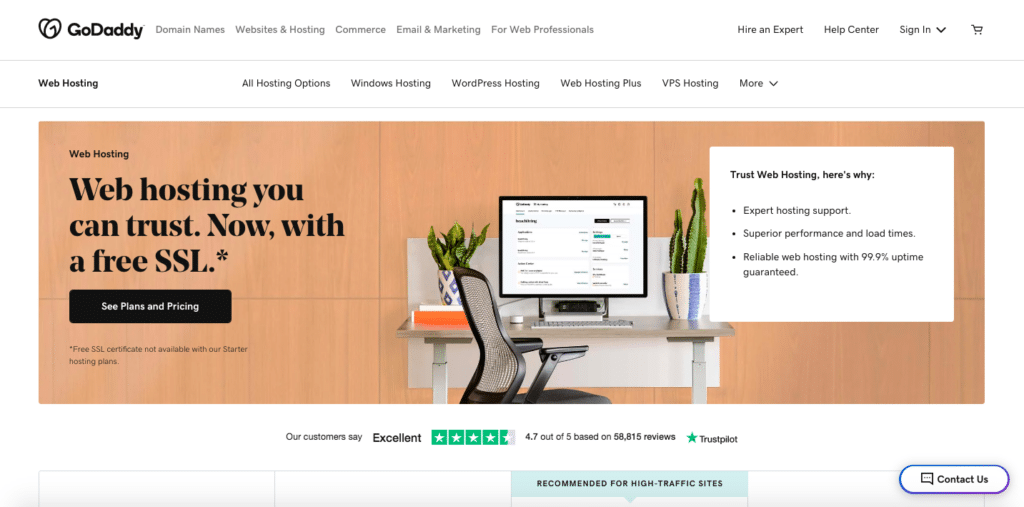
Godaddy’s web hosting plans are only available for a minimum of three years, but they’re worth the commitment.
Normally a domain name seller, Godaddy also offers great web hosting packages for small-business owners looking for an uncomplicated long-term web host.
Godaddy Key Features
- Reliable customer support from experts
- Better-than-average load times
- Daily backups
- Free SSL
- cPanel geared toward beginners
- Global data centers
Godaddy Pricing Plans
The Economy Plan is a good beginner option because it’s inexpensive with the essential features for running a small business.
It includes one website, 25 GB storage, easy WordPress installs, and a free domain name (for longer than a year!).
Godaddy Pros and Cons
Godaddy Pros
- Stable price
- Huge domain name selection
- Top-tier uptime
- Intuitive site builder
- Fast speeds
Godaddy Cons
- Limited scalability
- No cloud hosting
Best eCommerce Web Hosting Services
The best web hosting for small business should offer an online storefront, as long as your intention is to sell your products online.
Hostinger
If you’re looking to create an online storefront without overspending, we highly recommend web host Hostinger.
They offer eCommerce options that will allow you to create a seamless online store.
Hostinger uses WooCommerce — a store-builder based on WordPress — and PrestaShop.
In either case, you’ll be guaranteed 99.9% uptime and a 30-day money-back guarantee so you can try out these eCommerce options without losing unnecessary money.
Bluehost
Bluehost, like Hostinger, uses WooCommerce web hosting to help site users build their online storefronts.
There’s also a whole host (ha!) of other plugins that allow you to customize your storefront.
This is all included in an online store package currently on sale for $9.95 per month.
As a bonus, you’ll receive analytics reports so you can track your site’s popularity and growth.
If you run a service-based business, you can use Bluehost’s YITH features to allow customers to book appointments on your site.
YITH also offers gift card purchases, wish lists, and product filtering plugins.
Best WordPress Web Hosting Services
If you’re familiar with site building on WordPress and want to find a web host that will sync up nicely, consider WP Engine or Flywheel.
WP Engine
WP Engine is a great web hosting service if you’re looking for a budget-friendly, WordPress-Optimized beginner site.
This is one of the best web hosting or small business options due to features like their interacting staging environment.
This allows you to interact with and design your page layout to represent your store needs as perfectly as possible.
The sites controlled by this web host are known to load quickly, as well.
This is a major bonus because you won’t have to worry about potential customers clicking away due to slow loading times.
One of the best parts about this web host is that they’re a managed hosting company.
This means, their team will monitor your site’s security and fix potential errors that cause downtime.
Security management and site troubleshooting can be overwhelming for nearly anyone, especially people trying to run a business at the same time.
Flywheel
Flywheel is a subset of the web hosting company we just mentioned, WP Engine.
Flywheel runs its services using Google Cloud.
This means that backups are consistent and reliable, so you won’t have to worry about losing site developments.
Like WP Engine, Flywheel offers to manage your sites for you and keep an eye out for glitches.
Flywheel also offers great scalability as your business grows.
Best Free Web Hosting Services
If you’re just starting out your small business and are running a tight budget, consider these free web hosts.
By making a temporary site with one of these web hosts, you’ll give your customers access to your products without having to spend a dime.
Wix
Wix is a basic and easy-to-use web hosting.
It’s also a great option if you don’t need your site to be too extravagant or fancy.
The reason we make that qualification is that Wix’s site builder is composed of pre-made templates.
This means that Wix sites are fast to build, but don’t offer the advanced options of some other web hosts.
Wix’s site builder is loaded with an easy-to-use interface and creative tools so that you can customize your website to fit your needs within the template forms.
InfinityFree
InfinityFree offers the unmetered bandwidth, large amount of storage space, cPanel compatibility, and easy WordPress installations that the other web hosts we mentioned do.
The main sacrifice you’ll have to make for that sweet deal is fast loading times.
This shouldn’t be a problem at the beginning of your business-building journey, though.
This is because the traffic filtering your webpages probably won’t use the amount of bandwidth that’d slow your site down.
Once your business grows, you can scale up with our aforementioned web hosts.
What is a Web Hosting Company?
The answer we’ve all (or at least some of us, probably…) been waiting for!
Why do you need a web hosting service?
What do they actually do?
Web host providers are companies that, essentially, sell storage space on the Internet.
This storage space exists on hardware-based servers, also called hosts, which are computers that keep the software and other files required to run a website.
These files include HTML documents, Javascript files, images, etc.
Web hosting providers either own this hardware or rent/purchase it from even larger companies to then sell.
Companies that provide web hosts offer chunks of this storage space (along with the other features we discussed and more) to individuals, agencies, or other companies looking to run websites.
These sites offer hosting for a variety of different reasons, which we’ll get into in. the next section.
Before that, though, remember this: the site you’re on now exists because of a web host.
The site you were on before this exists because of a web host.
And, the site you’ll visit next exists because of.. yup, a web host.
Web hosts are like the back end of the web’s creation, and they’re responsible for a lot!
What Are the Different Types of Web Hosting Companies and Services?
As we mentioned, shared hosting is the most common and best web hosting for small business.
But what are the other types of web hosting?
WordPress Web Hosting
WordPress hosting is a type of web hosting that’s specifically tailored and optimized to run sites made on WordPress.
That’s like it sounds, but what does it mean?
WordPress hosts, like WP Engine, offer more tools and features that work in conjunction with WordPress than other sites.
These features can change depending on which service you use, but some commonalities are:
- Customer support trained in WordPress
- One-click installations
- WordPress software updates
eCommerce Web Hosting
An eCommerce web host will likely offer the best web hosting for small businesses.
This is because eCommerce sites serve the purposes of electronic storefronts.
This means they come with features like payment processing, commerce-based security, online shopping carts, etc.
Basically, everything you can think of that separates a retail site’s layout from something like a blog.
Shared Web Hosting
Shared web hosting runs multiple websites on one single server.
Compare this structure to an apartment with four roommates, where they each have individual rooms — the websites — but all share a common space.
This type of web hosting is a solid option for low-traffic sites, but it can bog down sites with a lot of clicks per day.
That’s simply because by sharing a server, you’re also sharing bandwidth with other sites.
Cloud Web Hosting
Cloud hosting is, as you might have guessed, less tangible than other hosting options.
With a cloud web host, your site won’t be deployed on one server.
Rather, it’ll be hosted in a network of both physical and virtual cloud servers.
This can create more stable uptime, an important aspect of small business web hosting.
Uptime increases are dependable because when one server goes down, there are many more in the server rhizome to ensure your site stays afloat.
VPS Hosting
A VPS is a Virtual Private Server.
This hosting type is like a mixture of dedicated hosting and shared hosting.
VPS hosting runs on a virtual shared server.
Your website is hosted among others, but you receive private (dedicated) host resources.
This is a good option for high-traffic sites because VPSs can handle increased clicks and maintain fast loading and tough-to-break security.
Reseller Web Hosting
Reseller web hosting is almost more of an activity than a type of hosting.
Reseller hosting can be any of these types of web hosting we’re currently mentioning.
It’s when host sites rent out storage for websites in bulk.
This then allows the purchaser to resell those hosts to people who want to run one, or a few sites.
Then, the job of the reseller is just to manage payment.
This is a cool option for people who want to make a profit without being responsible for managing the hosting space.
Dedicated Hosting
Dedicated hosting grants a physical web server to just one business customer.
That’s a lot of storage space!
Major sites with hundreds of thousands of clicks per day can benefit from dedicated server hosting.
As such, dedicated server hosting is rarer and pricier than other hosting options.
Our Final Thoughts
Web hosting is often an overwhelming subject, and small business web hosting brings its own slew of concerns.
That’s why we tried to make this article as straightforward and comprehensive as possible.
We hope you found some insight regarding the future of your small business’s web presence with this article.
No matter what type of hosting best suits your business, there’s something out there for you.
And there will continue to be as your business grows and expands!
As with all things involving the web, it’s best to do your research on what best fits your website and budget needs.
Make sure to read customer reviews and compare the different web hosts we mentioned before making a decision.
Not that we aren’t reliable, but you know your business better than anyone.
Best of luck creating and growing your small business website!
Small Business Web Hosting FAQ
Dreamhost and GoDaddy are two of the best beginner-friendly web hosting services.
They’re both highly intuitive site builders and stellar customer service to help guide you along the process of making your own sites.
Remember, though: the best web hosting is mostly dependent on your site needs.
GoDaddy is great for your small business website because it offers a variety of pricing plans.
You can depend on GoDaddy to help you find a package that will suit your needs without breaking the bank.
The best web hosting sites are constantly changing, but some top contenders are Dreamhost and HostGator.
Both sites are dependable, widely rated, and evolving with the times.
The best WordPress hosts are tailored specifically for WP-built sites.
Some good options are WP Engine and its subset, Flywheel.
The different types of web hosting services are as follows:
- Dedicated server hosting
- Shared web hosting
- VPS web hosting
- WordPress web hosting
- Reseller web hosting
- Cloud web hosting

